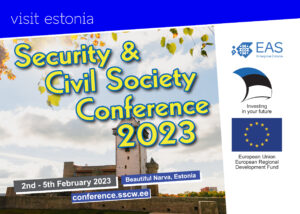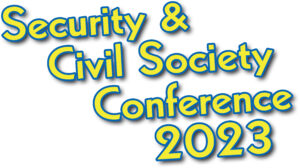Security and Civil Society Conference 2023
“Reflections on Security: International Community, CSOs and their contribution for a more secure and sustainable Europe”
2nd - 5th February 2023, in Narva & Narva-Jõesuu, Estonia (previous days was 15-18th December 2023)
Explore the various of options to achive peace and democracy in regional conflicts and support international cooperation in the achievement of UN SDGs.
OVERVIEW
Security & Civil Society Conference 2023 is a three-day event (3rd, 4th and 5th February 2023) that will include an intensive programme of high-level discussions, working groups, development of the civil society and international stakeholders appeal (declaration) to the international community. A one-day preparatory meeting and visits in Estonian Government Institutions and Estonian representation of the European Commission will be organised for the high level experts and invited speakers on the 1st and 2nd February 2023 in Tallinn.
The geopolitical shock and the consequences following from the Russian invasion in Ukraine are also influencing security and democracy development in three key regions: Charting Ukraine’s and Moldovan`s Future in European Union, conscious Nordic-Baltic security policies to becoming NATO members and global & regional influence on Mediterranean security environment. We will discuss the role of CSOs and different stakeholders in achieving peace and the importance of intercultural dialogue in healing divides and reconciling societies. Key foreign and security policy issues will be discussed mostly from the perspective of the Euro-Mediterranean region, Northern and Eastern parts of Europe.
The conference is an opportunity to reaffirm the significance of the importance of the work of the European Union, NATO, OSCE and its member states for promoting peace on the continent and achieving a safer, greener, socially sustainable and digitally integrated community. The conference will connect regional networks of practitioners, distinguished policymakers, civil society organisations, analysts, politicians, military personnel representatives, academics, media and international donors from Europe and foreign actors of the Euro-Mediterranean region and abroad.
At this conference, the Narva Declaration will be finalised and approved, together with local Citizens’ Action plans, which will be submitted to the European Commission, International Institutions, international and governmental organizations, media and various of thematic networks who is working on achievement of peace, security, democracy, rule of law and support of CSOs in Build Resilient Societies.
The conference is co-organised by a consortium of international partners from 10 countries. The conference is co-financed by the European Regional Development Fund through Estonian Development Fund. The conference is also supported (contently and/or financially) by British Council, Nordic Council of Ministers office in Estonia, Estonian National Foundation of Civil Society and Green Habito network members.
THE MAIN AIM
The main goal of the conference, with the support of renowned experts and speakers in the fields, is to try to adequately understand and decipher today’s exceptionally effective and large tangle of crises – to better understand the causes of its emergence and effects for society, which have already arisen and provide explanations for the tense situations that will predictably arise by increasing the awareness of civil society and cooperation with the state and private sectors. If necessary, objectively (condemn) and constructively criticize what is happening unfairly. At the same time, to pass on enough discouragement to encourage the people of Europe and Estonia and to calm the society, which would be expressed in straightforward messages that carry the security of the society and actions that protect peace. The aim of the conference is to explore possible solutions for stabilising European security, improving people’s cognitive security and supporting the achievement of the UN SDGs in the area of the green revolution, security and digital cooperation.
Additional objectives include:
- To explore how to use digital technologies to promote and engage communities and individuals to help achieve resilient society targeting peace and human rights protections;
- To identify how UN SDGs may be implemented on a local and international level;
- To share practical skills on how to utilise the existing international peace, green economy and digital instruments to improve security, enercy and climate policies, sustainability of society and develop better tools for good governance and dialogue withing regions.
- To support further development of Green Habito network and empowerment of stakeholders, government representatives and other relevant organisations to implement the outputs of the Internaational conference and contribute to dialogue and peace process in Europe;
At the end of the conference, a declaration of the conference will be prepared with proposals for a specific solution for the civil society sector on how to cope and promote their work during the crisis.
TARGET AUDIENCE
The international event is open to all interested individuals, representatives from public, private and civil society sectors whose work is connected directly or indirectly with politics, civil society, media, security questions, peace promotion and the UN SDG-s. We welcome youth organisations, educational institutions, finance industry leaders, academics, researchers, legislators, planners and policy specialists in all relevant areas, representatives from International institutions, intergovernmental organisations, governments, ministries or departments, international donors, national and regional human rights organisations. For international participants a total of 100 places are available.
For international participants a total of 100 places are available.
THE PROGRAMME
The programme will consist of plenary lectures and speeches, panel discussions, workshops, study visits, a round table and Working groups in World Café discussions formate involving all participants. Participants will be expected to share their experience – and emphasise to younger participants and CSOs their perspectives on the ‘art of the possible.’ They will also be expected to deliver targets and action ideas for implementation at local, national and international levels. The focus will be to contribute effectively to sustaining peace in regions, promote peaceful and inclusive societies for sustainable development by and spreading knowledge and outcomes to CSOs, research and political institutions, communities and individuals involved back in their home countries.
The Conference topics will cover:
- “Charting Ukraine’s Future in Europe as free, democratic sovereign state” / “Moldova’s Future: East, West, or Somewhere in the Middle?”: As International community and CSOs affirming the vital importance of having their number intricately involved in efforts to rebuild Ukraine’s infrastructure and institutions, and contribute to sustainable reforms; not just as watchdogs, but as true partners throughout the process, where each party could make own valuable contribution. Despite the rapidly changing reality and the upcoming geostrategic changes, we will try to present a positive agenda for the development of events for Ukraine and the world community in achieving peace throughout the internationally recognized territory of Ukraine. To understand Moldova future we need to be able to understand existing factors and challenges what country and society are facing including internal and external actors who play the leading role in the future of Moldova. Will the global powers enable to support the UN to be more effective at promoting peace and preventing conflict, through enhanced peace-keeping and conflict transformation;
- “Mainstreaming more conscious Nordic-Baltic security policies to becoming NATO members and supporting sustainable development to become the world’s most sustainable and integrated region in 2030”: The Nordic countries share a common security environment, and are engaged in close foreign, security and defence policy cooperation. Nordic foreign, security and defence policy cooperation has deepened further in the past few years. The Nordic Defence Cooperation (NORDEFCO) is a good example of the closer cooperation. With Finland and Sweden as NATO members, the threshold for using military force in the Baltic Sea region will rise, which will enhance the stability of the region in the long term. NATO is a stabilising actor in the Baltic Sea region and from Russian perspective not at all. In 2022 the war in Ukraine has affected the world – as hard security as the digital sphere – in unforeseen ways. The intentional destruction of infrastructure in Ukraine, including digital infrastructure, illustrates the need for resilience in communication networks in order to prevent the risk of regions being isolated. It also demonstrates how important it is that we can rely on our communication networks to ensure availability and continuity of essential services for our citizens. In addition to the cyber-attacks in Ukraine, we have also seen a growing trend of organized cyber-crime on an international level. Therefore, a high level of security in the digital services that our societies rely on, has become increasingly important.
- “Global powers, region states and civil society contributions in Mediterranean region for peace, security and sustainable development”: The mediterranean region continues to struggle with terrorism. Countries like Turkey and Egypt are stille facing violent acts perpetrated by radical groups, a situation which affects the European security environment as a whole directly and indirectly the threat of terrorism emanating from Europe’s southern periphery. These risks are hardly new, but they have acquired new meaning in light of the sustained conflict and political instability around the southern and eastern Mediterranean, and the persistent economic and social pressures across southern Europe. Above all, terrorism concerns and counter-terrorism partnerships will underscore the strategic importance of the region on both sides of the mediterranean at a time of flux in national, NATO and EU strategies. Mediterranean security environment as a whole will continue to be strongly affected by this threat, and the continued recruitment of terrorists throughout the region. State fragility in the Euro-Medditerenian regions and possible intersections of terrorism with systemic security issues in the global sense, including climate change, maritime issues, and migration will be addressed alongside the wider dimensions of military issues, including the presence of major powers naval units in the mediterranean and how each country views the other’s long-term regional ambitions
- “Climate Change and Energy crises: Green Revolution still achievable by 2050? – Transforming global consumption patterns and investing in clean energy – As electricity prices surge on the back of dwindling gas supplies from Russia, calls are growing to bring relief to European households and businesses – some of which are being pushed to bankruptcy. The calls are being heard as EU energy ministers prepare to hold an extraordinary meeting to discuss the EU’s response to the crisis and of course to keep in agenda green revolution what EU agrees to achieve by 2050. Experts will provide own perspective on existing crises and update of EU policies.
THE VENUE
Narva is a border town with Russia, which has historically been under both Swedish and Russian rule. Narva is located in a socially and economically deprived area, which is populated by a Russian minority community. Narva, which is over 95% Russian-speaking, is the third-largest town in Estonia. Narva is also one of the easternmost points of the current European Union map.
The venue of the conference is mainly Vaba Lava Theatre Centre in Narva and conference Centre of Meresuu SPA & Hotel Confernce.
Vaba Lava (in English: free stage) is a popular place in the former military factory complex Baltiets that provide performing space for local theatre companies, and will also provide an opportunity to present guest performances by both Estonian repertoire theatres and independent companies as well as theatre and dance companies from Russia, Western Europe and Nordic countries. The new space will be also used for festivals, concerts, seminars, workshops, masterclasses etc.
ACCOMMODATION
All the delegates are accommodated in two hotels: Meresuu Spa & Hotel and Narva Hotel. The conference fee consists of accommodation in shared rooms. Private rooms are available on request and additional fee.
OFFICIAL LANGUAGES
The working language is English and Arabic translations will be provided.
COVID-19
This Conference is designed as a hybrid event with most participants attending in person but organisers will provide possobility to join virtually for interested experts and CSO representatives from Ukraine, Moldova, Euromed and Nordic-Baltic regions.
REGISTRATION
The delegates are invited to participate in Security and Civil Society Conference 2023 by submitting their applications.
If your application has been accepted, we request each delegate to confirm the participation in 7 days by sending a letter to registration@sscw.ee or by phone +372 55602993.
More information, please write: Mr. Vassili Golikov – vassili@sscw.ee
NETWORKING
Please join the Conference Facebook group here




